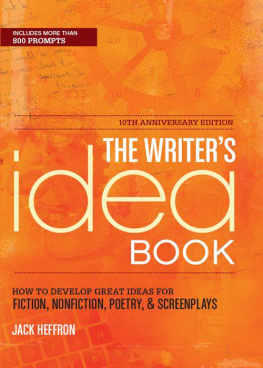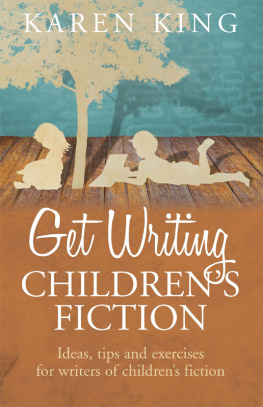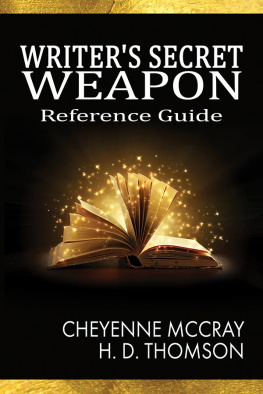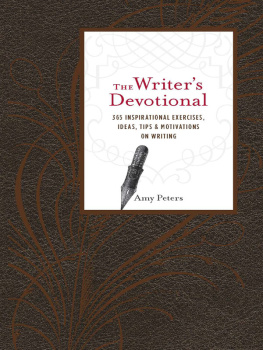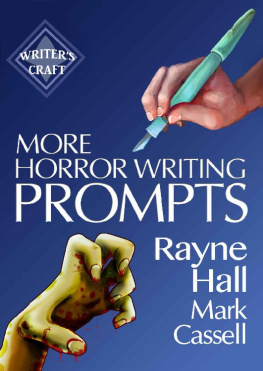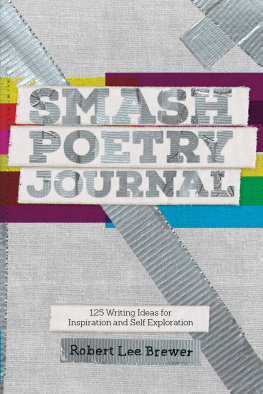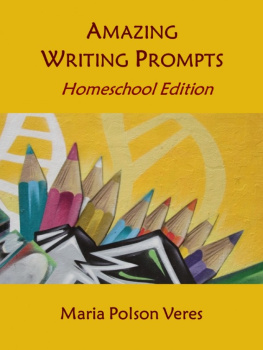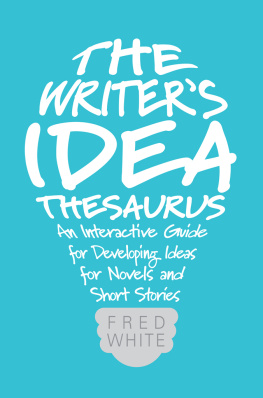PRAISE FOR THE WRITERS IDEA BOOK
In a field crowded with disappointing tomes, what a joy to open The Writers Idea Book and find vast regions of opinion and experience mined for creative fodder. As much fun to read as it is to use.
JANET FITCH, AUTHOR OF WHITE OLEANDER
The Writers Idea Book is a fascinating, no-nonsense, sit-your-butt-down-and-work approach invaluable to all writers hoping to stretch their imaginations, deepen their understanding of experience, and explore their moral visions. Not since John Gardners The Art of Fiction has there been such a useful and informative and comprehensive resource book. In fact, if writers have only one book about writing on their shelves, it should be this one.
LAURA HENDRIE, AUTHOR OF STYGO AND REMEMBER ME
Jack Heffrons The Writers Idea Book is the literary equivalent of attending the Actors Studio. Wise, entertaining, and inventive, the book liberates beginning and advanced writers alike, helping them get to the heart of their story.
DAVID MORRELL, AUTHOR OF FIRST BLOOD AND BROTHERHOOD OF THE ROSE
What an inspiring book! The Writers Idea Book does exactly what it sets out to dooffer writers at all stages of their careers a seemingly endless variety of ideas to noodle around with, explore, and ultimately make their own. Jack Heffrons voice is so nurturing, funny, and wise that, as he guides you along the writers path, youll feel as though youve made a new best friend.
JANICE EIDUS, AUTHOR OF THE CELIBACY CLUB AND URBAN BLISS
The Writers Idea Book is an excellent workbook for people interested in any kind of writing. The advice is helpful and practical, without making grand promises or arousing inflated expectations in the writer. I recommend it highly.
JOANNE GREENBURG, AUTHOR OF I NEVER PROMISED YOU A ROSE GARDEN AND WHERE THE ROAD GOES
Every writer out there will benefit from The Writers Idea Book. Whether you are just starting out, are immersed in a project, or simply feeling stuck, Jack Heffron has an idea to help you along. This is a book to keep close at hand as you will be referring to it often!
ANN HOOD, AUTHOR OF THE PROPERTIES OF WATER AND SOMEWHERE OFF THE COAST OF MAINE
10th Anniversary Edition
THE WRITERS
idea
BOOK
How to Develop Great Ideas for Fiction, Nonfiction, Poetry, and Screenplays
Jack Heffron
Cincinnati, Ohio
www.writersdigest.com
For Michael and Nick,
and for Amy
ACKNOWLEDGMENTS
Given that this book is actually three books in one (different versions of two of them published years ago) I have a lot of people to thank. For this edition, Im grateful to the folks at Writers Digest who made it possible: Phil Sexton, Kelly Messerly, Suzanne Lucas, and Scott Francis, my editor. Without Scotts cool handand saintly patienceI dont know that the book would have been completed. Previous editors at Writers Digest who provided advice and encouragement on the earlier books are Michelle Howry, Meg Leder, and Donya Dickerson, who all remain treasured friends.
I also need to thank my colleaguesand very dear friendsat the Writing it Real Conference, Sheila Bender and Meg Files. They have taught me many lessons about the craft of writing and have been some of the most important friends in my life. Meg and Sheila are the bestin so many ways. The conferees who have attended the conference through the years also deserve thanks because they, too, have offered no end of encouragement and insight, not to mention wonderful company. There have been too many to list each of them, but I must give special mention to Betty Schafer because shes, well, special.
Thanks to my good friends and great writers Mark Garvey, Brad Crawford, Elissa Yancey, and John Kachuba, who have been supremely valued sounding boards for ideas and projects through the years and have been the best of friends. Rhonda Sandberg, a gifted teacher of writing and a special friend, has provided much support and insight through the writing of these books, and Im deeply grateful to her for all shes done.
Of course, no one suffers through the writing of a book as much as our families, and mine has always supplied no end of support and patience. Thanks to Mary, Joe, and Anne Marie Heffron; my niece, Mercedes; as well as to Kara and Katie; and to Gette, Joey, Christian, and Mia.
CONTENTS
PART I:
PART II:
PART III:
PART IV:
PART V:
AUTHORS FOREWORD TO THE NEW EDITION
Its tough for me to believe that ten years have passed since the first edition of The Writers Idea Book was published. I remember writing it as if it was, well, not yesterday but not all that long ago. At that time I didnt imagine it would still be around a decade later, and since that time I have heard from many writers who found something valuable in its pagessome exercise that launched a rewarding project. Those letters and e-mails are always gratifying to receive.
Ive learned much since that first edition, through the process of putting words on the page, as well as from teaching. At the time when the original edition was published, I had just begun teaching at what became an annual writers conference with two amazing colleaguesSheila Bender and Meg Files. And were still doing it. What began as the Colorado Mountain Writers Conference has evolved into the Writing It Real Conference, produced through Sheilas online magazine by the same name. Through the years, Ive learned from Sheila and Meg, as well as from the hundreds of writers who have come to the conference, each with a story to tell.
One lesson Ive learned is that the exercise that tickles our fancy is not always the one that sparks the best writing. Sometimes we reap the most results from an exercise that forces us to struggle, to push a bit harder. Writers at all levels of experience tend to go toward the path of least resistance, but often we need the resistance in order to find the material we most need to explore.
Sometimes, frankly, the starting point doesnt matter much at all. The initial challenge presented by an exercise can be merely a gatewaya means to accessing deeper, richer material. After our imaginations connect with that material, we must leave the first inspiration behind, which, of course, is not always easy to do.
In her essay Notes for Young Writers, author Annie Dillard explains: Usually you have to rewrite the beginningthe first quarter or third or whatever it is. Youll just have to take a deep breath and throw it away once you finish the work and have a clearer sense of what it is about. Tear up the runway; it helped you take off, and you dont need it now. This is why some writers say it takes courage to write. It does. Over and over you must choose the book over your own wishes and feelings.
As you write your way through this book, keep these thoughts in mind. It is a journey that requires courage. And faith. Sometimes a piece of writing takes its own sweet time in revealing itself to us. If were truly engaged by the materialeven if on some days we feel more doubt than faiththen we need to push on, believing that a discovery will reward our patience and our trust.
In short, you can begin anywhere. Close your eyes, flip open the book, and jab a page with your finger. Then begin with the nearest exercise. You might, as some of my students have done in the past, let out a loud groan, thinking you have nothing to say in response to the prompt. That might be just the one you need to do. Give it a try.

